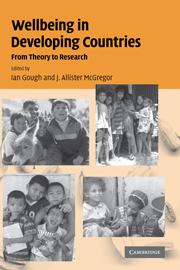Book contents
- Frontmatter
- Contents
- Figures
- Tables
- Notes on contributors
- Acronyms
- Preface
- Introduction
- 1 Theorising wellbeing in international development
- Part I Human needs and human wellbeing
- 2 Conceptualising human needs and wellbeing
- 3 Basic psychological needs: a self-determination theory perspective on the promotion of wellness across development and cultures
- 4 Measuring freedoms alongside wellbeing
- 5 Using security to indicate wellbeing
- 6 Towards a measure of non-economic wellbeing achievement
- Part II Resources, agency and meaning
- Part III Quality of life and subjective wellbeing
- Conclusion: researching wellbeing
- References
- Index
2 - Conceptualising human needs and wellbeing
Published online by Cambridge University Press: 22 September 2009
- Frontmatter
- Contents
- Figures
- Tables
- Notes on contributors
- Acronyms
- Preface
- Introduction
- 1 Theorising wellbeing in international development
- Part I Human needs and human wellbeing
- 2 Conceptualising human needs and wellbeing
- 3 Basic psychological needs: a self-determination theory perspective on the promotion of wellness across development and cultures
- 4 Measuring freedoms alongside wellbeing
- 5 Using security to indicate wellbeing
- 6 Towards a measure of non-economic wellbeing achievement
- Part II Resources, agency and meaning
- Part III Quality of life and subjective wellbeing
- Conclusion: researching wellbeing
- References
- Index
Summary
Needs and wellbeing: issues and themes
What are the relationships between human needs and human wellbeing? I will address the question by considering the conceptual linkages between these two umbrella categories. This requires investigation of the nature of each of them as a family of concepts. That is attempted in sections 2.3 and 2.4 of this chapter. I briefly point to the further topic of their empirical connections in section 2.5. Bracketing these discussions, the opening and closing parts of the chapter consider and compare human needs and human wellbeing as research programmes. How far is the wellbeing programme a continuation or successor to the tradition of thinking and investigation on human needs, and what lessons may arise from the somewhat troubled history of research on needs?
The rise of wellbeing as an important, if not yet major, research focus in development studies and policy and more widely is extremely welcome and long overdue. As recently as 1994, Routledge's The Social Science Encyclopaedia (Kuper and Kuper 1994) could appear without an entry on wellbeing or quality of life or happiness. Even in two excellent late 1980s textbooks on the emergent field of economic psychology (Furnham and Lewis 1986; Lea, Tarpy and Webley 1987) wellbeing remained a minor theme. Lea et al. in over 500 pages did not discuss it as a separate topic; Furnham and Lewis devoted just four pages to the relationship between wealth and happiness.
- Type
- Chapter
- Information
- Wellbeing in Developing CountriesFrom Theory to Research, pp. 47 - 70Publisher: Cambridge University PressPrint publication year: 2007
- 49
- Cited by



